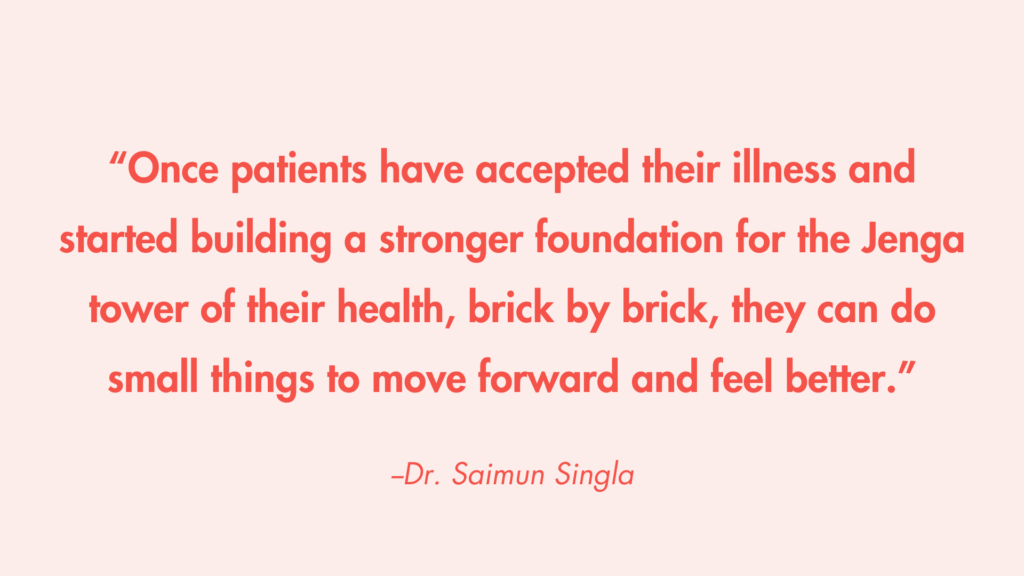Building a Solid Foundation for Health with Integrative Medicine
October 18, 2024
Written by Saimun Singla, DO, FACR, Pediatric Rheumatology & Integrative Medicine
For patients with chronic conditions like rheumatoid arthritis, traditional medicine or even functional medicine may not be sufficient to support the patient’s needs alone, and this is where integrative medicine comes in.
The main difference between functional and integrative medicine approaches is how the provider navigates diagnosis and treatment. In this article, we will explore the differences between integrative medicine and functional medicine and the key role integrative medicine plays for patients with chronic, lifelong conditions.

What is Functional Medicine?
Functional medicine focuses on finding the root cause of the illness, utilizing lab tests to provide information about metabolics, food sensitivity/intolerances, digestion, parasites, mold, and gut microbiome status.
Functional medicine aims to understand how symptoms that might not seem connected may actually be the result of the same root cause. In this way, functional medicine looks at the disease itself rather than the whole person and aims to address symptoms by addressing the root cause.
Looking for a “root cause” when it comes to autoimmunity may not be the right term or approach. The reason is that when it comes to autoimmunity, the “match has already been lit,” so to speak, and eliminating triggers will not lead to a reversal of this type of illness.
The immune system is complex, and for the majority of patients with autoimmune disease, the condition cannot be reversed or cured, but it can be managed holistically so it doesn’t need to take center stage of your life. This is where Integrative Medicine comes in.
Related Article: Ambitious Women Thriving with Chronic Conditions: Jessica March
What is Integrative Medicine?
Integrative medicine looks at a patient’s overall health and well-being, combining conventional therapies, like medications and surgery, with evidence-based complementary therapies like yoga, acupuncture, manual medicine, and supplements for example. It takes a 360-degree approach, looking at the whole person including physical, emotional, social, spiritual, and environmental factors.
With integrative medicine, health can be likened to a Jenga tower. The blocks of health are built one on top of the other, and any time you remove a block, there is a chance of toppling the whole structure. For example, many patients with chronic conditions experience flares when they are under a lot of stress. Integrative medicine recognizes how these experiences are connected, believing that it’s important to address all aspects of health and lifestyle to achieve optimal well-being.
Integrative medicine also recognizes that external factors outside of the patient’s control can play a role, like social support. It considers these social and psychological factors and aims to support the patient in navigating the ups and downs that come with successfully managing a chronic disease.
One of the challenges of integrative medicine is that it is not a one-size-fits-all approach. For example, everyone’s nutritional needs will be different, and this can make the journey to optimal health more difficult for patients. It often requires trial and error. The integrative medicine approach often doesn’t provide instant gratification, it requires commitment from the patient to maintain habits that will help them feel better.
Read More: Introducing Lauren Perna Communications: Chronic Boss Summit Premier Sponsor
Key Elements of Integrative Medicine
Outside of conventional evaluation and management of illness, integrative medicine emphasizes all areas of health and lifestyle as key elements of well-being:
- Nutrition
- Sleep
- Movement
- Mind-Body
- Manual Medicine
- Acupuncture
- Supplements
- Social & Family Support
- Resilience
Once patients have accepted their illness and started building a stronger foundation for the Jenga tower of their health, brick by brick, they can do small things to move forward and feel better. This entire process leads to increased resilience and increases their ability to bounce back from future setbacks. For patients with chronic illness, integrative medicine is a powerful tool to help improve overall health and well-being.

Dr. Singla is pediatric rheumatologist and integrative medicine physician who treats autoimmune illnesses. Ironically, she was diagnosed with rheumatoid arthritis after becoming a rheumatologist, a backwards journey that led to a shift in how she now treats chronic disease. She is the founder and CEO of Rheum to Grow, a medical practice in Houston that blends the best of Western and Eastern medicine.
